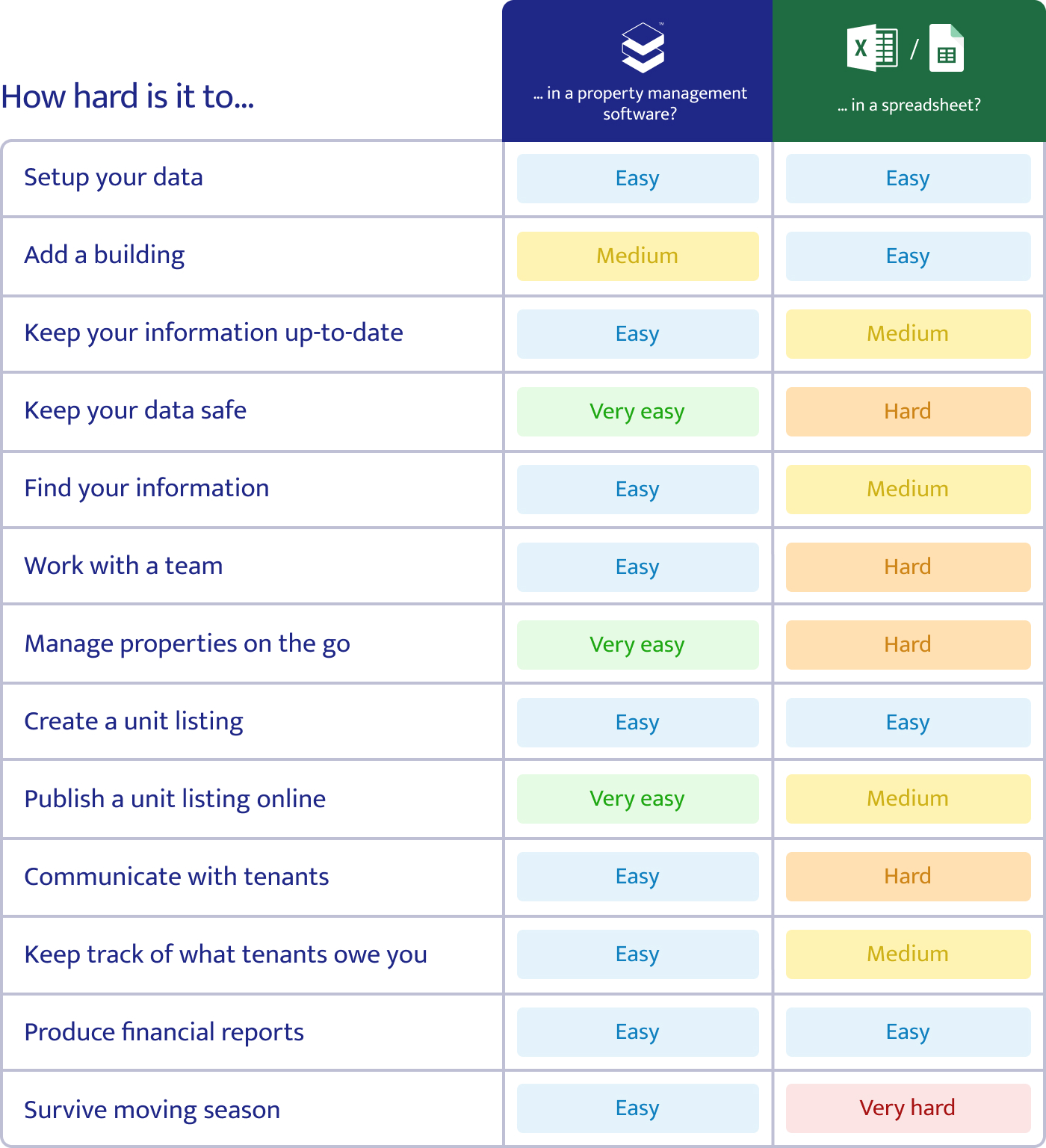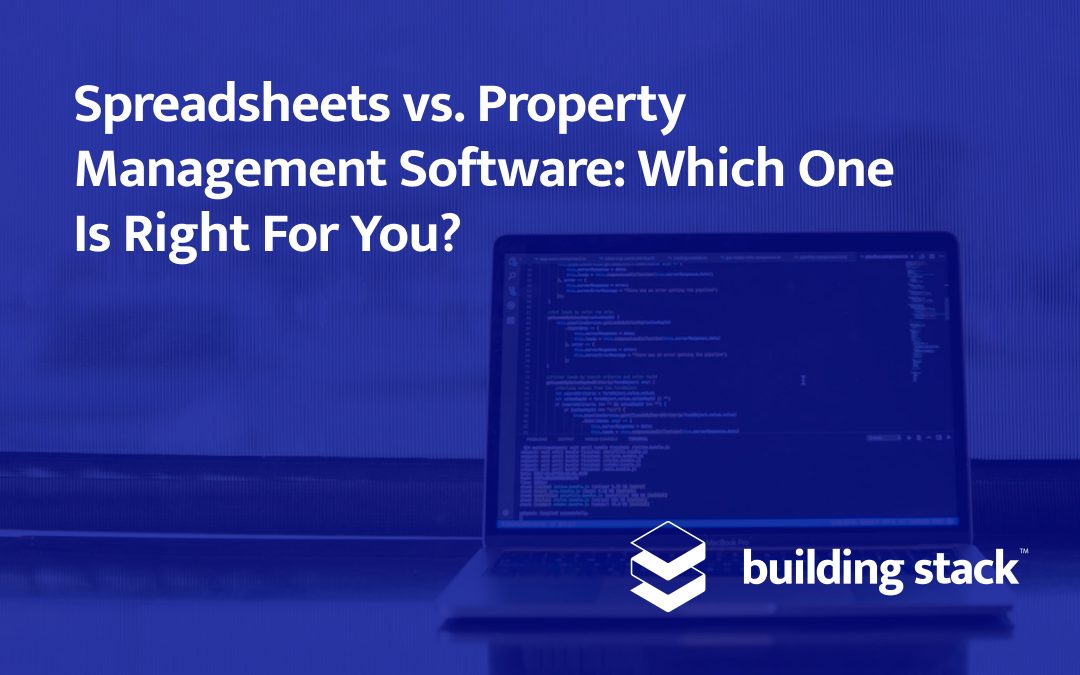Your rental properties are doing pretty well and your business is growing steadily. You’re slowly building up your portfolio, adding new rows to your spreadsheets as you acquire more units. But now, you’re finding it hard to keep your data in order, and you’re wondering if it’s time for you to invest in new technology.
As a novice rental property manager, there’s no exact number of doors you need to have before a software purchase becomes justifiable. It all depends on your current situation, and on your goals as a real estate investor.
Read our advice below to find out if a property management software is the next step for you.
What information do you need to store for your properties?
The first step would be to gather all the information that you need to keep track of. Whatever data management method you choose, this is the bare minimum that has to be logged somewhere:
- Financial data for each of your properties
- Marketing content (unit description, pictures, etc.)
- Tenant and lease information
- Prospective tenants information
- Employees and contractors information
- Maintenance requests and task list
There are probably some things missing to our list, so go over your daily tasks and add any other type of data that your organization might be using.
Then, think of a strategy that will help you make sense of all this. Do you want to use one spreadsheet with multiple sheets? Separate files and folders? There is no right or wrong answer here, but remember that your processes need to be as scalable and straightforward as possible.
Spreadsheets would work best for you if…
You manage only a handful of properties, and you don’t plan on acquiring more.
If you own just one building with fewer than 10 doors, or only a few rental properties, then the advanced features of an elaborate software might not be worth the investment. However, remember that if your goal is to acquire more buildings, a complete software will help you get there faster.
You manage your properties alone, or with a very small team.
Although there are now cloud-based tools such as Google Sheets that allow multiple people to work simultaneously on the same file, don’t forget that, by giving someone access to your spreadsheets, you allow them to see all the information they contain, edit them, and even save a copy on their own machine. When dealing with sensitive information, a password-protected file stored on your hard drive is always the safest option.
You want to use specific tools for specific tasks.
As useful as spreadsheets are, they can’t handle all of your work. You can’t use them to set reminders, send e-mails, print building memos and so on. This gives you the flexibility to cherry-pick every single application you decide to use for your tasks, but it also means that you have more tools to learn, and that your information is spread out across various platforms.
You are well versed in formulas and conditional formatting.
Spreadsheets aren’t exactly visually attractive, but there are ways to make important information stand out, using colours and bold type according to certain conditions. If you intend on using spreadsheets as your main work tool, find out how to use their advanced features to your advantage. You may find some templates that fit your needs by searching online, but some tweaks will be required, and don’t forget that the more changes you make, the more likely you are to break formulas.
You’re very organized.
Whether you choose to store your information on a physical drive or on the cloud, make sure to set up a folder organization for all the different files and spreadsheets that you have, and to follow it through and through, unless you want to spend hours searching for a tenant’s phone number in a mishmash of unsorted files.
You should get a property management software if…
You have a lot of data to keep up-to-date.
In spreadsheets, changing the monthly rent of a unit can mean editing several files and sheets. This is fine if you only manage 1 or 2 units, but if you have 20, 50 or even 100 units to update (and watch out for input errors!), you might not do much else that day. However, if you use a property management software, any change that you make is applied across the entire platform, so you can quickly move on to the next task.
You manage your properties on the go.
Sure, you can access all your spreadsheets from the cloud, but have you ever tried to search through dozens of rows and columns from your teeny-tiny mobile screen? If your work requires you to step away from the computer for large portions of the day (and we know it does), a mobile-friendly app is a must-have.
You work with a team.
As we mentioned earlier, collaboration on spreadsheets can cause confusion, not to mention security issues. Luckily, property management applications are made for teamwork, with features like internal messaging and automatic issue assignment. Moreover, you have full control over what your employees and contractors can see and do on the platform, so your tenants’ personal data remains safe and sound.
You have a high tenant turnover.
Vacant units can cause profit losses, which is why finding new tenants quickly is a crucial part of property management. With automation tools that publish listings to multiple channels, you can fill up your vacancies in a few clicks and avoid losing money over an empty unit. But besides enabling you to find new tenants faster, a property management software might even help you keep your current ones happy by solving issues more efficiently. And because happy tenants are less likely to move out, your turnover stays low.
You want to accept online rent payments.
Besides saving you a trip to the bank every month, an online payment solution has many advantages. First of all, your tenants will love it, because it saves them a trip to the post office every month, but the best part is certainly how it simplifies your bookkeeping. The payments you receive through a fully integrated platform are automatically processed and saved in your accounting reports. No more complicated formulas, no more input errors.
You’re not particularly tech savvy.
One of the best things about property management software is that there is a whole team of developers taking care of the technical stuff for you. Instead of rows and rows of data crammed together, you get a sleek overview of your portfolio and an easy access to your information in a few intuitive clicks.

Many people think of a property management software as an expense, but they forget that time is also money. If you take into account the precious man-hours that a specialized tool will save you, you’ll realize that investing in the right technology can actually be a cost-saving measure.
Are you wondering what your life would look like with a property management software? Find out now by getting a free demo of Building Stack!
